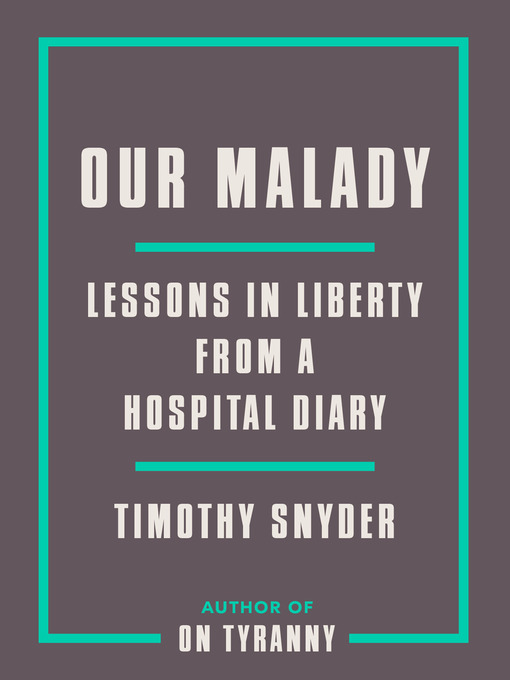
Our Malady
Lessons in Liberty from a Hospital Diary
درسهای آزادی از دفتر خاطرات بیمارستان
کتاب های مرتبط
- اطلاعات
- نقد و بررسی
- دیدگاه کاربران
نقد و بررسی

July 27, 2020
Historian Snyder (The Road to Unfreedom) frames this searing critique of the American health-care system around his own recent medical emergency. After a series of medical mistakes related to an appendectomy, Snyder nearly died before undergoing surgery for a severe liver infection in December 2019. Doctors treating the appendicitis had seen a lesion in his liver but did nothing to treat it; a different set of doctors botched a spinal tap and missed clear indications of a liver problem in Snyder’s medical records. These were not isolated mistakes, according to Snyder, but symptoms of a systemic failure in which doctors and nurses are not given enough time to meet with patients and truly assess their needs, and are encouraged to prescribe medication rather than get to the root of the problem. Snyder also contrasts his wife’s medical care during pregnancies in Vienna and the U.S., and sketches the Trump administration’s inadequate response to the Covid-19 pandemic. According to Snyder, the present state of health care violates America’s founding principles: “Freedom is impossible when we are too ill to conceive of happiness and too weak to pursue it.” Though he doesn’t offer much in the way of specific solutions, Snyder draws valuable context and insight out of his harrowing personal experience. The result is a troubling portrait of a system in which the patient is the last priority.

August 1, 2020
The award-winning Yale historian launches a broadside against the American health care system. "The day that had just begun, December 29, 2019, could have been my last." So writes Snyder about his hospitalization and subsequent poor treatment over the next few months, experiences that left him enraged at the state of health care in America. "In five hospitals over three months," the author found himself with a front-row seat to the beginnings of the coronavirus pandemic. He took detailed notes during his time as a patient, and he clearly shows a health care system far more interested in profits than health, a system that follows the dictates of computers and algorithms rather than any one-to-one relationship between doctor and patient. Snyder delivers a scathing critique of this "grotesque" and "ludicrous" system as well as a government response to the pandemic that he dismisses as "magical thinking." Indeed, the Trump administration's "unwillingness to test did not mean that we were healthy, only that we were ignorant," and the "focus on a foreign source of 'fault' meant that no one here was to blame. When no one bears responsibility, no one has to do anything." The author meticulously documents the health problems he suffered--among many others, a burst appendix, tremors, and "an abscess the size of a baseball in my liver"--seemingly all of which were ignored or misdiagnosed by doctors. Snyder compares the impersonalized, economy-driven care he received in American hospitals with the far more nurturing treatment he and his wife had experienced during a childbirth in Austria, a procedure that was both "intimate and inexpensive." Ultimately, writes the author, "our botching of a pandemic is the latest symptom of our malady, of a politics that deals out pain and death rather than security and health, profit for a few rather than prosperity for the many." An impassioned indictment of a broken system and its enablers and necessary reading as the pandemic intensifies.
COPYRIGHT(2020) Kirkus Reviews, ALL RIGHTS RESERVED.

September 1, 2020
The malady discussed here is one that Snyder (history, Yale Univ.; On Tyranny) says permeates our society. From the end of 2019 until March 2020, the author found himself intimately involved with the U.S. health care system when his appendix burst following a missed diagnosis, leading to an overlooked abscessed liver and septicemia; it brought him to the brink of death. Once able, he began journaling his experiences, feelings, and conclusions about how we care for one another. He emerged from his personal battle directly into the new world of COVID-19. With this lens, the author describes what he sees as clear evidence of disparity in health care accessibility in the United States, in which the highest spending in the world produces poor results compared with other developed countries. He argues for health care as a human right, and asserts it is not recognized as such in this country. Advocating for a universal system with medical professionals rather than insurance companies in charge, he believes, would allow patients more freedom in their health care choices. VERDICT Snyder writes with passion and clarity, using personal observations, historical references, and case studies to raise the call for reforming the current health care system; stating that without changes, true freedom remains elusive for many.--Richard Maxwell, Porter Adventist Hosp. Lib., Denver
Copyright 2020 Library Journal, LLC Used with permission.

























دیدگاه کاربران